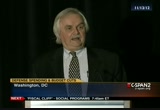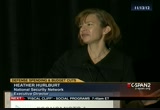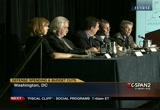tv International Programming CSPAN November 14, 2012 7:00am-7:30am EST
7:00 am
smaller, newer fleet, it is a smaller older fleets. and if you think that is going to be a higher capability fleet let's engage in that discussion because it is not going to be. the third point. dod's leadership is completely mentally and prepared to face any of this stuff. i couldn't help but do a god, thank god i didn't spew all my coffee on my computer screen, when i saw that somebody is floating senator john kerry's name as a candidate for secretary of defense. i couldn't help but read that above the article in the washington post, he didn't get the job for secretary of state
7:01 am
and somebody is trying to throw some sort of bob. people like john kerry are completely incapable of helping the pentagon deal with this problem, even that problem. led of the on the problem that is going to occur. the other candidates for leadership of the pentagon to be it through this era, a very smart -- no background in any of these issues. the other candidates is ashton carter. he is perceived as a good manager. if you look at his job on the f 35 i simply cannot agree. he is not picking on the fundamental efforts of problem
7:02 am
represents. he let it float to the future and it is going to face a phase in this, even in the sequestered scenario, it will do nothing but increase the cost on airplane which is a disappointment in terms of performance and that is a result of his management. i don't see him as a competent candidate to lead the pentagon through this future, thank you very much. >> thank you, winslow wheeler. our final speakerheather hurl r hurlbert is, prolific author, former speech writer and has been very active in national defense issues.
7:03 am
>> thank you. i want to apologize for being late. talking about congress and the future it was nearly a dramatization of what i make my remarks. and to contract comments my three predecessors have made i want to make three comments about political realities and what it will mean about the dynamics they have pointed to and the fact you see on the screen will play out. and so there are two of these arrows that point in one direction and a third in a different direction. the first arrow being as this graph shows you and as you know from your own work in other economic areas the funds available for endless pentagon spending, funds available for a strategy that says if we buy it it will make us more secure, that era is over and as the chart shows and as winslow
7:04 am
wheeler implied, there was a eight or nine year run where nobody said no on anything and some of us may have worked in a culture like that, very few of us probably have. that really changes and institutional culture in problematic ways and people around washington were out of the pentagon for a number of years had occasion to go back, remarked on how difficult it is to say no and how much this up flow that you see from 99 to 2010 had changed the culture internally and much of what winslow wheeler said reflects that underlying reality. second, there has in fact been a significant shift in foreign policy appetite in national security both on the part of the two parties and on the part of the american public. what do i mean when i say that?
7:05 am
there is no appetite for another land war in asia or continuing the land war in asia we have in afghanistan and we saw in the concluded presidential campaigns that the candidate who had a wing of the party pushing to take the view we should be in afghanistan longer, that we should do more, something militarily in iran but continually pushed away from that by the more politically minded wing of the party reading internal polling that says there's not much difference on afghanistan between republicans and democrats so you don't have the demand side for the kind of military spending we have seen over the last decade and no longer have public outcry from military spending as a response to terrorism. the second point related to that which is a two edged sword is
7:06 am
the public believes that there are cheaper technological solutions to our national security problem and the most obvious exponents of this is drones and other remote wrote -- invading a country, you can just the public perceives and many of thes received drone along its border. there's a fascinating strategic conversation about whether that is correct and will work out over time. there's also as anyone who has worked in this field knows, the fact that technology is rather expensive and that also justifies the need for an endless growing budget if your security is completely dependent on keeping your high tech offense ahead of both lower tech defense your adversaries will navigate against you. so technology is put forward and
7:07 am
believed by the public to be a budget panacea but it is not. the third point that should be made about appetite is -- i would go further and say we saw in this election at the presidential level and the congressional level went across party lines and effort to make candidates pay for expressing willingness to cut pentagon spending and had zero effect and the massive infusion of corporate contributions and political efforts which had close to a zero return on investment. if anyone can think of a counterexample we can talk about it in the q&a but bill mentioned the presidential campaign and you have a concerted effort in virginia to take out a senate candidate on the grounds that it would be harmful to the state defense industry. that didn't work. you have a concerted effort, also didn't work, across party
7:08 am
lines and interesting in western michigan where you have a libertarian republican and a veteran running against him, a democrat who had no trouble getting reelected. ron and rand paul have not suffered elect corley in their communities in states with their stance on defense spending. there is political ground, the will to spend has shifted dramatically. there's one lagging indicator as we say and that is what i will call political code dependency between on the one hand both parties really and the corporate military contractor but even more than the actual reality of the defense spending in our economy, there is the perception of the role defense spending and
7:09 am
defense and military play in our economy and the perception that cuts to work growth in pentagon spending is shorthand, not just for how you much you care about jobs but how much you care about troops and american security and we start with the public because as i said the public is clear across party lines, land wars, not interested in big new military adventures of any kind, feel confident technological solutions that address terrorism problems. at the same time the public is willing and interested to hear about and -- fraud related pentagon cuts but believes if you just go in and cut the pentagon you will hurt troops and heard their families and heard veterans and it has to be said the public is not entirely wrong in thinking this because the single biggest drivers,
7:10 am
troops, benefits, retirement, health care. also interesting how in the public mind the entire military establishment and troops have become synonymous. they also don't believe we spend more on the pentagon which is a big change from four five years ago and reflect the changing view of how we keep our security but not comfortable with spending any less but there is in the public mind and be elite mind the idea of a 1-1 correlation between what we spend and what we get and the question of do you feel safer today than you felt in 2007? that is an interesting one. it is a reality underlying all of the political discourse in this area. within the military, winslow wheeler started to touch on this. they felt there are winners and
7:11 am
losers. that is a fabulous battle going on under a blanket that most of us don't see but will have an affect on us. the army is a big loser. the army is a big loser when not having land wars for obvious reasons. the army is a big loser if you shift your interests from an area of the world where much of what you're doing is dealing -- if you shift your emphasis from an adversary where is hypothetically possible to imagine invading and occupying countries to the pacific which is about an ocean and potential adversary china which nobody thinks he will invade and occupy with land forces and the question is what we doing with an enormous army. second loser is those equipment manufacturers and specialists who produce things that useful for land combat and high intensity warfare. we saw this play out with the abrams tank. what was it originally designed
7:12 am
to do? back to the point about long lead times. was designed for the cold war. there is no place in the world we are fighting empty battles like we are envisioned in germany. the abrams tank military said we have more than we will need in the future and that makes complete sense from the strategic point of view, from the military-industrial base point of view and more problematic from the military-industrial labor base point of view it is more problematic and there are numerous other systems we will see coming up in the future where this will play out. the third point to make is between diversified and and diversified contractors. they are smart. they saw this coming. there started to be massive consolidation and buy out and layoffs in the contract you see three years ago and some contractors have been expanding
7:13 am
the civilian side and develop assistance into domestic homeland security. other contractors have not. when you look at which contractors have been most aggressively pushing the panic button over sequester versus which ceos made public announcements like this is an opportunity to be smart, that is the underlying dynamic we are looking at. if you are a politician who happens to come from a state whose primary military contractors were not very smart you have a problem where as if you happen to come from a state whose contract is a diversified that are now doing surveillance you can say i can't help you on your pentagon items but i can help you with the cdc. that will be complicating a piece of the political landscape. folks with big army bases are going to have a problem, folks on the west coast, where it
7:14 am
makes more sense to base your assets toward the pacific and east coasts a more more problematic. that one's a interestingly with things around population shifts and other things we should mention. nuclear weapons which we come back to this technological argument and those who remember fights about nuclear-weapons in previous decades. nuclear weapons are of no use against terrorists and no use against -- it is hard to deter someone who doesn't have a return address. we have so many more than china. in that sense they are useless and expensive and we can get rid of them but you also see as recently as the peace in foreign affairs that came out this week, relatively speaking nuclear-weapons are cheap and in the pentagon's world this is true. why don't we use nuclear weapons
7:15 am
to assured deterrence and then don't have conventional forces in korea. or we can reduce the number of conventional resources we facing korea and you see it is interesting freight off of what is cheap. when you are discussing budgetary questions in the absence of strategy, the absence of really hard strategic look at these things we are going to get into the -- sheet in the short term and sheep in the long term which will play out in the ways my panel colleague the mentioned. i will make one last provocative point to start a fight among panel members, and disagree with winslow wheeler. having said all of this what do we want for pentagon leadership? what should we want to make sure we are managing the reality behind these numbers in a politically smart and security smart way? it is not clear to me it is a bad idea to have someone who
7:16 am
isn't steeped in pentagon management and having someone who does come from outside or hasn't spent is or her whole career looking his or her way up to pentagon management and has the single most important ability in whoever the next secretary of defense to say why do we do it that way? the person who has been willing to challenge that repeatedly would be my lead candidate. [applause] >> winslow wheeler, would you like to respond? >> sure. a perfectly reasonable challenge. pentagon leadership, let's call it secretary of defense over secretary of state, you don't need a competitor, to idly think
7:17 am
over a notion of what we should do here or there. you don't want a second secretary of state. second you want somebody with demonstrated emphasis, emphasis on the word demonstrated confidence, somebody from business who has done it rather than talk about it. there are candidates out there. people who have done it. that kind of person needs to be found. third, pentagon experience is nice if you demonstrate mastery of bureaucracy.
7:18 am
ashton carter has not. two qualifications here. can you find somebody from the private sector who has done build downs and knows the kind of intellectual and moral toughness you have to engage in on that many rice bowls. or can you find somebody inside the pentagon bureaucracy who shows some real mental and that kind of ability to face down the joint chiefs, and 79 or 80 and that kind of foolishness, there are people out there, i won't condemn them for ever mentioning their name.
7:19 am
let's get serious, if you want a policy, john kerry will be fine. >> carl would like to respond. >> the principal problem we face is not to leads dod. there is a special challenge their that is evident if you think about how much of the government is dod, this is the largest sector of the government and it is a special sector. a few list taking them broken up into various parts that contend with each other. navy, air force, army, marine corps, they themselves break down into various parts and disclose intersection with industry that adds another
7:20 am
element, managing that and gaining on top and gaining control and directing in any direction that reflects national policy, that is a difficult -- i don't know that john kerry is particularly well-suited for that. i don't have an opinion on that but we must appreciate how difficult that job is. a bigger challenge is to produce national leadership outside of dod that will take charge of the national security discourse, national security strategy and not think first through the lens of the defense department and individual services which play an enormous part in deciding our strategy. i don't think they should. i think the strategy should be set in the national security council and the secretary of state and by the white house. we need more strength on that end of things to channel the country in the direction that
7:21 am
minimally can recognize the principle strategic competition we face today is not military, but economic. you are not going to get that leadership, that in sight at dod. there's a real challenge but the principal challenge for dod is somebody who can direct this collection of feudal kingdoms that want to go in their own direction but the bigger challenge is to have stronger leadership that will point the country in a different direction. take a look at the spending of other countries in the world gdp wise. every country seems to recognize and get the truth that we are now in an era defined by an economic -- that is where principal problems lie. it is indicative of that level
7:22 am
to the military, and we come in at 4.7% gdp, the average for other countries is 2%, and the nature of the challenge today, china, leader among them and they devote less gdp to that and are probably happy to see us get ourselves wound up in this new battle concept which has us turning away from land wars in asia, if we can have a land war, let's -- for a lot of money into its military, but relative to what else they're doing with their gdp they understand the principle challenge is economic and that will determine who the world leader is in 2015. we don't get it yet and we won't
7:23 am
get that leadership regardless who you put in that chair. >> we would welcome questions or comments from the audience and have some action with you. >> acquistion, my understanding was actually obama has not reduced the 4 pentagon budget but i think your charge implies that he has and i am assuming the 5% reduction you are including all of the savings hopefully from us getting out of afghanistan but even when obama presented his budget he said this is going to be -- this is an increase in the core pentagon budget for the next ten years. am i misunderstanding something or is that correct? >> a little bit. i talked about 5%, reduction in
7:24 am
real terms. if you look at the spending in current dollars and don't make any correction for inflation. it has been pretty flat in terms of current dollars. the base budget has only declined by 5% but the war budgets have declined, at one point we had budget in the range in today's dollars of $717 billion a year for national defense including war and now what we are looking at is something perhaps $100 billion lower than that so there has been that reduction. it has all been principally due to the reduction in work spending. what we are not paying attention to is the base budget spending, non war spending which grew enormously during the period and
7:25 am
there is a chart that shows the total change in spending since 1997. the blue line represents the total and the red line represents the base budget. you will see both are pretty dramatic, the war played a huge part. and if you include the war. then you have to go back and think about 1998-99, defense spending grew by 100%. what we have seen over the last 12 years is a rise in spending that combines the reagan surge with the vietnam surge with the earlier surge introduced by kennedy at the beginning of the 60s. we have not seen anything like this short of the second world war and it is fact that they're refusing to back off from. >> the point of the biggest
7:26 am
problem is the absolute number where it would be implied but if you look at it visually or mathematically compare that with the post korean war cuts it looked even bigger on a percentage basis, what would the consequences when that happens? >> at the very beginning what we are talking about, consequences were very bad. consequences of the drop that happened and you don't really see the period of the war itself but we went down so far so fast that a high level in releasing people who were in the military for many years, our capacity to deal with korea was undermined so then you see this huge jump up but nobody is talking about
7:27 am
anything like that. i would take a look at the purple wine and the red line and say dod should be able to digest sequestration relatively easily. and happen all at once. it happen over three or four years leaving the budget above the orange line so we will still have a budget above the cold war level. i think you could go down lower but i would wait a few years to see what develops because we can't see that far into the future. nothing like what happened after the second world war. >> the worry about sequestration, every product
7:28 am
across the board. that is what the law says, not what they would probably do if they actually had to do a. they're perfectly award -- aware of what it takes to get around that faring grain across the board cited. the other point is more important. whatever happens in this budget deal, the only people, the people who know where the budget negotiations are headed are not talking and people who are not talking don't know what is going on. i read the newspapers these days, somehow the pentagon budget is going to be affected, it is going to be over the long term and it is coming down. it is not going to be the
7:29 am
mechanism triggered by sequestration even if january 2nd happens and technically it starts, there will be at some point a budget deal that subsumes all that but it is coming down. they will be lucky to have leveled off at the sequestration level on that graph. >> if i could pursue that a moment. i think what you are saying is by a budget deal you mean the pentagon leaders will come to congress and suggest some way of -- >> they will do what they are told. the president will negotiate a budget deal that will include spending line for national defence. the secretary of defense will be consulted about that but the pieces that go into t
143 Views
IN COLLECTIONS
CSPAN2 Television Archive
Television Archive  Television Archive News Search Service
Television Archive News Search Service 
Uploaded by TV Archive on

 Live Music Archive
Live Music Archive Librivox Free Audio
Librivox Free Audio Metropolitan Museum
Metropolitan Museum Cleveland Museum of Art
Cleveland Museum of Art Internet Arcade
Internet Arcade Console Living Room
Console Living Room Books to Borrow
Books to Borrow Open Library
Open Library TV News
TV News Understanding 9/11
Understanding 9/11




























